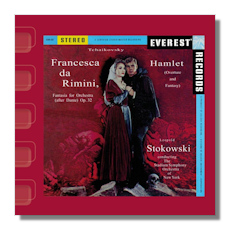
The Internet's Premier Classical Music Source
Related Links
- Tchaikovsky Reviews
- Latest Reviews
- More Reviews
-
By Composer
-
Collections
DVD & Blu-ray
Books
Concert Reviews
Articles/Interviews
Software
Audio
Search Amazon
Recommended Links
Site News
 CD Review
CD Review
Piotr Ilyitch Tchaikovsky

- Francesca da Rimini
- Hamlet
Stadium Symphony Orchestra of New York/Leopold Stokowski
Everest SBDR-3011
This record simply crackles with character. Armed with what is essentially the New York Philharmonic, Stokowski wrings every drop of color and passion from these scores without really altering them in any way. This is all a good thing too; by staying faithful to what Tchaikovsky wrote, the players focus solely on the music at hand, and simply catch fire. The original LP coupling means this is a short disc, but if you're willing to get up after the 42 minutes is over, you'll probably just end up playing it again.
Francesca da Rimini is one of those pieces that gets recorded a lot, but great accounts are surprisingly hard to find. Stokowski's counts among the best, featuring staggering playing and that fabled Everest stereo sound. While I've found a lot of these productions lacking sonically, this is a disc that probably sounded great before re-mastering, so it still sounds great now. Mind you, this is no real fault of Countdown Media, which has lavished real care on these albums being brought back to the market. Oh yeah, the music. Stokowski simply rips into these scores, and so do his New York forces. There are some deliciously creamy string textures to be had, along with lovely winds and – predictably for this conductor – some atmospheric and very prominent harp. I love it, and I bet you will too. It's not all bombast, and arguably nobody before or since responded as well to Tchaikovsky's genuine romanticism as did Stokowski. Great music played like great music is the best way to describe it.
The more elusive Hamlet is also a major work. At almost 20 minutes, it's a piece that deserves more exposure. Like Francesca, Stokowski rises to the challenge and delivers a thrilling rendition. The conductor and his charges are in an excitable state, whipping up excitement through seemingly relentless forward thrust. The New Yorkers play like a band possessed. There's not a whole lot of subtlety here; if that's what you wanted, you picked the wrong composer. Few musicians could be as wayward and frustrating as Stokowski, whether he was twiddling with a score or with the mixing levels. For the most part though, the conductor's Everest recordings not only show him working with composers he was genuinely compatible with, they also demonstrate the man's ability to stay true to the music at hand. He may have been notable for being excessive, but Tchaikovsky's music responds better than most to this kind of thing. The "sound" that Stokowski always seemed to crave – but more importantly always got – is just as evident here as in Francesca. Winds and strings are to die for, and the exciting parts simply are the last word in how to make this music interesting. No, a disc with two tracks isn't easy to sell. I can see many buyers taking the download option. I urge you – whether from iTunes or Amazon.com – to get this album while you can. It's a genuine clinic on Tchaikovsky, and one heck of a good time.
Copyright © 2014, Brian Wigman













